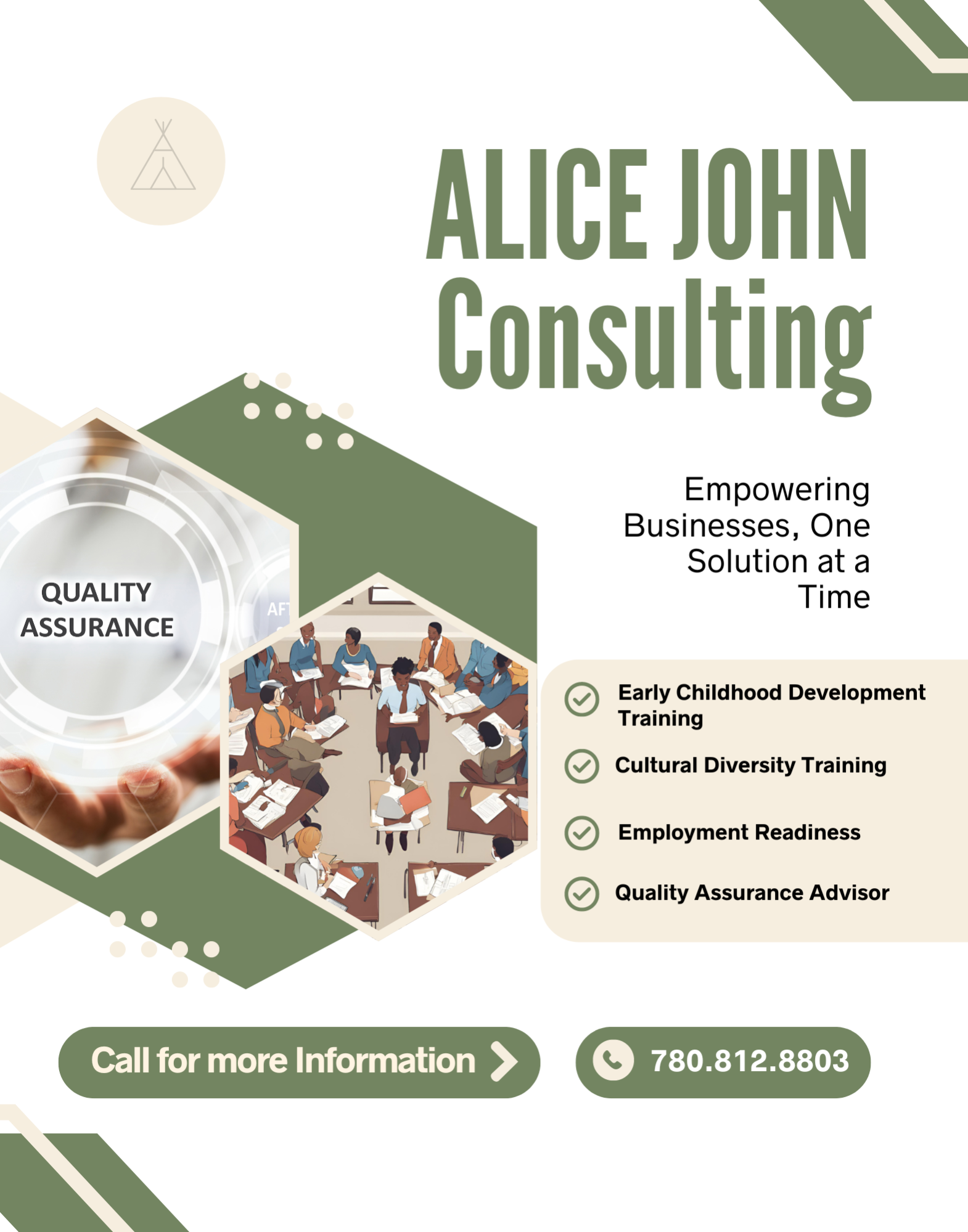
Alice John Consulting
Categories
Business & Professional Services
About

ECD Training / Cultural Diversity Training / Employment Readiness / Quality Assurance Advisor
Early Childhood Development Training
Early Childhood Development Training is a specialized program designed to equip individuals with the knowledge, skills, and strategies necessary to support the optimal growth and development of young children. It focuses on understanding the physical, cognitive, social, and emotional milestones and needs of children from birth to around eight years of age. This training is essential for parents, caregivers, educators, and professionals working in various early childhood settings.
The primary goal of Early Childhood Development Training is to ensure that children receive the best possible start in life and that their developmental needs are met in a nurturing and stimulating environment. The training covers a wide range of topics related to child development, including but not limited to:
- Physical development
- Cognitive development
- Social and emotional development
- Learning environments
- Responsive caregiving
- Observation and assessment
- Cultural and individual diversity
Early Childhood Development Training plays a crucial role in laying the foundation for children's lifelong learning, health, and well-being. By equipping caregivers and professionals with the knowledge and skills to support early childhood development effectively, it promotes positive outcomes for children, strengthens families, and contributes to the overall well-being of society.
Cultural Diversity Training
Cultural Diversity Training is a specialized workshop designed to enhance awareness, understanding, and appreciation of cultural differences within a diverse workforce or community. It aims to foster an inclusive and respectful environment by educating individuals about the value of cultural diversity and promoting effective communication and collaboration across different backgrounds.
The training typically covers a wide range of topics, including but not limited to race, ethnicity, religion, gender identity, sexual orientation, age, socioeconomic status, and physical ability. Its primary objective is to break down barriers and biases, challenge stereotypes, and create a sense of empathy and respect for diverse perspectives and experiences.
During Cultural Diversity Training, participants are often exposed to various educational methods, such as presentations, group discussions, interactive activities, case studies, and role-playing exercises. These approaches encourage active engagement, critical thinking, and self-reflection, allowing individuals to examine their own beliefs and attitudes towards different cultures and identities.
Key components of Cultural Diversity Training may include:
- Awareness of cultural differences: Participants are introduced to different cultural practices, traditions, and belief systems, increasing their understanding of how these factors shape individuals' experiences and perspectives.
- Unconscious bias: The training helps individuals identify and address unconscious biases that may influence their interactions with people from diverse backgrounds. It promotes self-awareness and encourages individuals to challenge preconceived notions and stereotypes.
- Effective communication: Participants learn strategies for communicating respectfully and effectively with individuals from different cultural backgrounds. They explore the role of verbal and non-verbal communication, active listening, and the importance of empathy and open-mindedness.
- Conflict resolution: Cultural Diversity Training often equips participants with skills to navigate and resolve conflicts arising from cultural differences. It emphasizes the importance of finding common ground, seeking understanding, and promoting constructive dialogue.
- Inclusive workplace practices: The training may provide guidance on creating inclusive policies and practices within organizations. This includes fostering equal opportunities, accommodating diverse needs, and promoting a culture of respect and acceptance.
Benefits of Cultural Diversity Training include:
- Increased cultural competence: Participants develop a deeper understanding and appreciation of different cultures, which enhances their ability to interact with individuals from diverse backgrounds.
- Enhanced teamwork and collaboration: By promoting inclusivity and respect, the training fosters better teamwork and collaboration among individuals with different perspectives and experiences.
- Improved customer service: Cultural Diversity Training equips employees with the skills to engage effectively with a diverse customer base, leading to improved customer satisfaction and loyalty.
- Reduction in discrimination and prejudice: The training helps to dismantle stereotypes, biases, and discriminatory behavior, fostering a more inclusive and equitable environment.
- Organizational growth and innovation: Embracing cultural diversity can lead to increased creativity and innovation within organizations, as diverse perspectives bring new ideas and solutions to the table.
Cultural Diversity Training plays a crucial role in building inclusive communities, workplaces, and societies, promoting understanding and respect for all individuals, regardless of their cultural background. By fostering a climate of acceptance and appreciation, it paves the way for a more harmonious and productive environment.
Employment Readiness
Employment Readiness Training is a comprehensive program designed to prepare individuals for successful entry into the workforce or to enhance their existing employability skills. It equips participants with the necessary knowledge, tools, and strategies to navigate the job market, secure employment opportunities, and thrive in a professional environment.
Our curriculum takes a holistic approach to management and spans the employee lifecycle, from interview skills to employee development and growth. Our programs are based on cutting edge organizational research, and focus on honing six core manager capabilities:
- Coaching
- Inclusion High Performance
- Direction
- Execution Growth
- Motivation
- Development
Employment Readiness Training plays a crucial role in empowering individuals to navigate the job market, secure employment, and thrive in a professional setting. By addressing the skills gap and enhancing job readiness, it facilitates economic growth, reduces unemployment, and fosters a skilled and competent workforce.
Quality Assurance Advisor
AJ Consulting provides quality assurance and continuous improvement advice and recommendations to ensure services provided are in accordance with standards and regulations governing child welfare services. My goal is to ensure Supervisors and Directors are aware of the compliancy of their staff with respect to the standards set forth by the Province of Alberta, and to provide real-time and accurate data on client information and numbers so management can make informed decisions with regards to workflow or to meet the needs of their respective community.
Membership Type
Indigenous - Private Owned Business